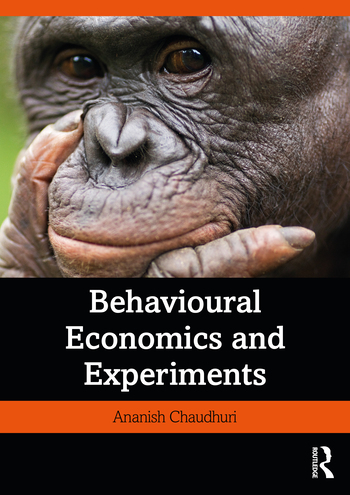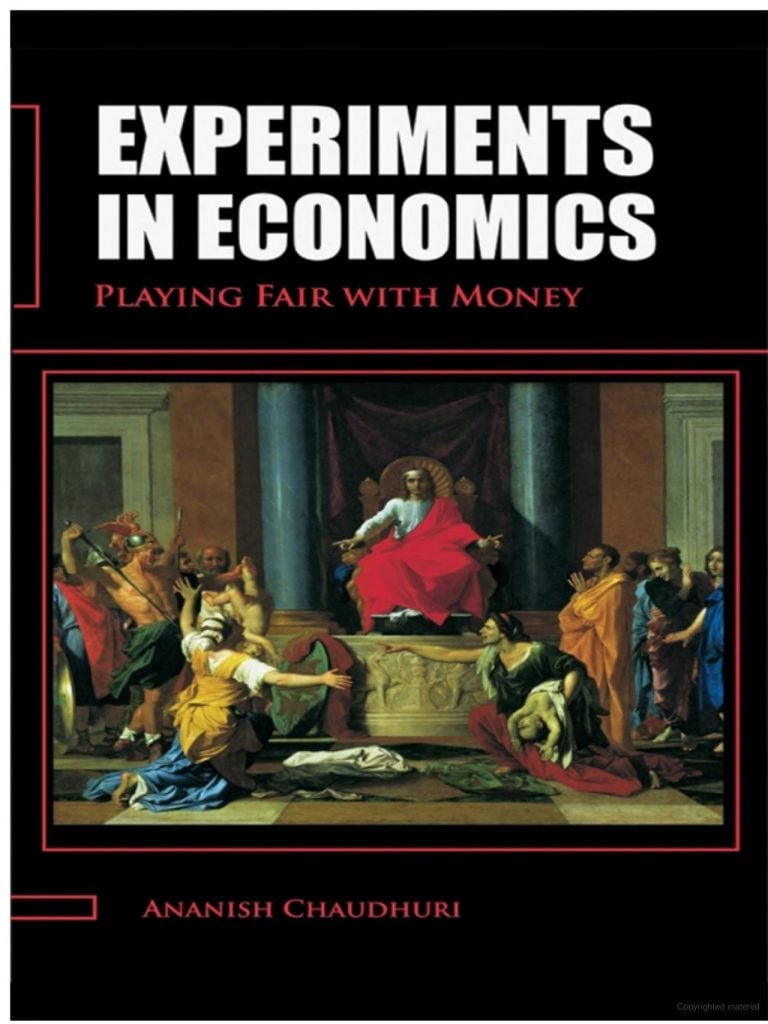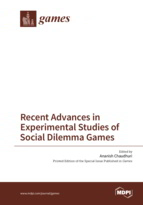
Behavioural Economics and Experiments coming out in May 2021. from Routledge.
Endorsements
Filled with real world examples ranging from sports to politics and backed by experimental evidence, this book takes the reader on a wonderful journey examining human behavior, individual and collective decision making, trust, fairness, cooperation and competition. Chaudhuri is a gifted writer, and the book will be treasured by experts in the field as well as those who would like to learn more about behavioural economics.
Iris Bohnet, Albert Pratt Professor of Business and Government; Academic Dean, Harvard Kennedy School; Author of “What Works: Gender Equality by Design”
I strongly recommend this clear, lively and engaging book to all readers, including those without any training in economics, who want to understand how real people decide how much to trust others in everyday life.
Paul Seabright, Director, Institute of Advanced Study in Toulouse; Author of “The Company of Strangers” and “The War of the Sexes”
This is an extremely absorbing book covering key topics in behavioural and experimental economics, but with applications and anecdotes that go far beyond economics. The book provides an excellent overview of the field and its most recent developments. It is an indispensable source of inspiration for the researcher and a treasure trove of examples for the teacher.
Martin Kocher, Director, Institute for Advanced Studies, Vienna; Professor in Economics, University of Vienna; Former Co-Editor, Journal of Economic Psychology
Chaudhuri has written an extremely readable introduction to experimental economics. This is perfect for advanced undergrads or graduate students who want to learn about state-of-the-art research without being smothered by technical details.
David J. Cooper; Brim Eminent Scholar in Economics and Director of XS/FS, Florida State University; Former Co-Editor, Experimental Economics
This book is a perfect introduction to behavioral and experimental economics and fills a much needed niche for the classroom. Ananish Chaudhuri is a gifted author whose conversational writing style is easily accessible for undergraduates, yet detailed enough to use as an introduction for graduate students. He motivates each topic with engaging real-world examples before discussing related research. It’s a fun book to read and students will certainly enjoy it. Highly recommended.
James Murphy, Rasmuson Chair in Economics, University of Alaska, Anchorage; Affiliate Faculty, Economic Science Institute, Chapman University
Dr. Chaudhuri’s new book on behavioral economics teaches us how human psychology impacts the decisions that we make. His book reflects his teaching style: Professor Chaudhuri uses straight-forward, real world stories to clearly explain behavioral economics theories. This book is easy to read and a great way to learn these important concepts.
Belinda Juran, Retired Partner, WilmerHale, Boston, USA; Advanced Leadership Initiative Fellow, Harvard University, 2020
Table of Contents
- Preface [Read the Preface]
- Chapter 1: How we decide
- Chapter 2: Experiments in behavioural economics
- Chapter 3: Gut feelings and effortful thinking
- Chapter 4: Expected utility theory and prospect theory
- Chapter 5: Probabilistic thinking
- Chapter 6: Thinking Strategically
- Chapter 7: The Ultimatum Game
- Chapter 8: Market implications of the Ultimatum Game
- Chapter 9: Trust and trustworthiness in everyday life
- Chapter 10: Trust and trustworthiness in markets
- Chapter 11: Cooperation in social dilemmas
- Chapter 12: The carrot or the stick: Sustaining cooperation in social dilemmas
- Chapter 13: I will if you will: Resolving coordination problems in organizations
- Chapter 14: Behavioural Analysis of Markets
- Chapter 15: Asset bubbles in markets

Research Agenda in Experimental Economics forthcoming from Edward Elgar in early 2021.
Endorsements
This adventurous collection samples widely from interesting domains of economics experiments. It touches all the important themes in why lab control is so extraordinarily useful for understanding general economic principles, and what we can look forward to.
Colin Camerer, Robert Kirby Professor of Behavioral Economics; Director, T&C Chen Center for Social and Decision Neuroscience, Caltech
This collection of articles in behavioral economics spans many of the exciting directions in which behavioral economics advances our understanding of human behavior. It serves simultaneously as a great introduction to the topic and a fantastic guide for future directions.
Uri Gneezy, Epstein/Atkinson Endowed Chair in Behavioral Economics; Professor of Economics and Strategic Management, Rady School of Management, University of California, San Diego
Ananish Chaudhuri has brought together an impressive collection of articles by leading scholars, exemplary in both breadth and depth of coverage. The book highlights the central role experiments play in contemporary economic research, and will leave readers inspired to bring experimental economics to their own research agendas.
Dan Houser, Professor and Chair, Department of Economics and Director, Interdisciplinary Center for Economic Science, George Mason University; Editor-in-Chief, Journal of Economic Behaviour and Organization; Former Editor-in-Chief, Journal of Neuroscience, Psychology and Economics
This is a very exciting book. It covers topics of experiments in economics that are quite well-known to the field, but also newer areas such as entrepreneurship, neuroeconomics, sleep deprivation, or political ideology. Both experienced researchers and researchers that are not familiar with the experimental approach will find a lot of interesting material, thought-provoking results, and detailed information about study designs. The book speaks to economists and other social scientists as well. The authors are top researchers in their areas.
Martin Kocher, Director, Institute for Advanced Studies, Vienna; Professor in Economics, University of Vienna; Former Co-Editor, Journal of Economic Psychology
An exciting potpourri of papers nicely illustrating the range of contemporary research being done with the still-emerging toolkit of experimental economics, this volume is edited with a keen eye towards fundamental issues of methodology, and with a bias towards societally important topics. Chaudhuri is to be commended for bringing together a great set of contributors and providing his own uniquely thoughtful insights in the introduction.
Louis Putterman, Professor of Economics, Brown University
While experimental economics has been around for more than half a century its usefulness is still underappreciated. This book aims to demonstrate the potential of experiments in a wide variety of applications from the study of norms to environmental issues, gender, politics and law. As such, the book lays out the versatility of the experimental method and its policy relevance. With chapters written by experts in each area the book should be a must read for those interested in expanding their analytical and policy toolkits. I strongly recommend it.
Andrew Schotter, Professor of Economics and Director, Center for Experimental Social Science., New York University
Table of Contents
- Chapter 1: Introduction to the volume; Ananish Chaudhuri [Read the introduction.]
- Section I
- Chapter 2: An Informational Framework for Studying Social Norms; James Tremewan and Alexander Vostroknutov
- Chapter 3: Experiments in Law and Economics; Alice Guerra
- Chapter 4: Complying with Environmental Regulations: Experimental Evidence; Tim Cason, Lana Friesen and Lata Gangadharan
- Chapter 5: Behavioural Characteristics, Stability of Preferences and Entrepreneurial Success; Pushkar Maitra and Ananta Neelim
- Chapter 6: Experimental Evidence on Behavioural Nudges in Health; John Gibson
- Section II
- Chapter 7: The Gender Leadership Gap: Insights from Experiments: Catherine Eckel, Lata Gangadharan, Philip J. Grossman and Nina Xue
- Chapter 8: Experiments in Political Psychology: Kyle Fischer, Quentin Atkinson and Ananish Chaudhuri
- Chapter 9: Neuroeconomics: Sarah Cowie, Ian Kirk and Olav Krigolson
- Chapter 10: Sleep and Decision Making: David Dickinson

Experiments in Economics: Playing Fair with Money, Routledge, January 2009.
Reviews
In the Journal of Economic Literature, David J. Cooper of Florida State University wrote: What this book is perfect for is giving interested readers who are not professional economists a flavor of what experimental economics does and why it is important. It is the book I gave my mother when she wanted to understand what I was always babbling about (she loved it!)…
Giovanna Devetag of the University of Perugia writing for the Journal of Economic Psychology said: The book is fun to read, well written, and different kinds of readers may find it useful: the professional reader can obtain a broad-brush picture of the state of the art in a very lively area of behavioral game theory, getting some idea about the most interesting controversies on the sources of human cooperation. … The most important merit of the book is definitely the author’s attempt at making experimental research (and its many interesting implications) available to a more general public, which is essential, I believe, in filling the gap between academics within the social sciences and society at large.
Angela de Oliveira (University of Massachusetts – Amherst) in the Journal of Behavioral and Experimental Economics: (The book) will make a good introduction for the general public, or (if supplemented with some information on market experiments) for use in an undergraduate class in experimental economics. Even for seasoned researchers, this review is an enjoyable read and the examples are useful for presentations to audiences not familiar with experimental or behavioral economics and would make a good addition to an academic’s bookshelf.
Endorsements
This is an excellent volume on experiments in economics, demonstrating that expectations for fair outcomes and trust are major driving forces behind economic behavior. Chaudhuri explains themes such as price discrimination, gift exchanges and public goods, neatly including their roles in economic behavior. The many clear examples make the book accessible to a wide audience. I expect this book to find a prominent place in many economic libraries.
Ernst Fehr, University of Zurich
Despite the great interest in experimental and behavioral economics over the past 20 years there is still a dearth of books that one can use to teach from and which can be used by laymen to learn what is going on in this rapidly changing field. Ananish Chaudhuri has written a wonderful book which is motivated by real world experiences yet closely tied to the state of the art research in experimental and behavioral problems. Dealing with problems of trust, fairness, social coordination, public goods and social dilemmas Chaudhuri takes the reader on a wonderful adventure from which he or she will certainly benefit. I highly recommend this book.
Andrew Schotter, Professor of Economics, Director, Center for Experimental Social Science, New York University
Chaudhuri has written an extremely readable introduction to experimental economics. This is perfect for advanced undergrads or graduate students who want to learn about state of the art research without being smothered by technical details.
David J. Cooper, Professor of Economics, Florida State University
With lucid prose and a wonderful set of examples, Ananish Chaudhuri brings important results in experimental economics to life, linking concepts such as trust, fairness and reciprocity to our everyday actions. At the same time, Experiments in Economics introduces the reader to the science, with engaging accounts of how economists use experiments to get answers to key questions in strategic decision making.
Gary Bolton, Professor of Business Economics and Executive Programs Faculty Fellow, Smeal College of Business, Pennsylvania State University
Are people fair-minded and helpful or selfish in the end? Why and whom do people trust? Why do people engage in community work? Why do people obey social norms and conventions? Not long ago these questions, which are at the heart of social life, were deemed outside the realm of economics. The advent of experimental economics and the interchange with the behavioral sciences has changed this picture entirely. Professor Chaudhuri is to be raised for having written a highly readable and informative account of one of the most exciting developments in the social sciences.
Simon Gaechter, Professor of the Psychology of Economic Decision Making, University of Nottingham
Ananish Chaudhuri has produced a masterful guide to the experimental literature on behavioral economics. Full of interesting real world examples, this exceptionally well-written book is accessible to non specialists. Yet, it nonetheless provides important insights into the scientific methodology of experimental economics, examining just how its practitioners go about designing experiments to elucidate the roles that abstract concepts such as fairness, trust, and reciprocity play in explaining human interactions. Regardless of whether one is a behaviorist, experimentalist, or “traditionalist”, this is a must read.
John C. Panzar, Professor of Economics, University of Auckland and Louis W. Menk Professor (Emeritus), Northwestern University

Recent Advances in Experimental Studies of Social Dilemma Games is a collection of articles exploring the issue of sustaining cooperation in social dilemma games and showcases the state of the art in this area. The papers were originally published in a Special Issue of the journal GAMES, an open access journal published by MDPI. Subsequently, the articles were published in this collected volume. For anyone interested, copies can be ordered from either the publisher (MDPI) or from Amazon.com.